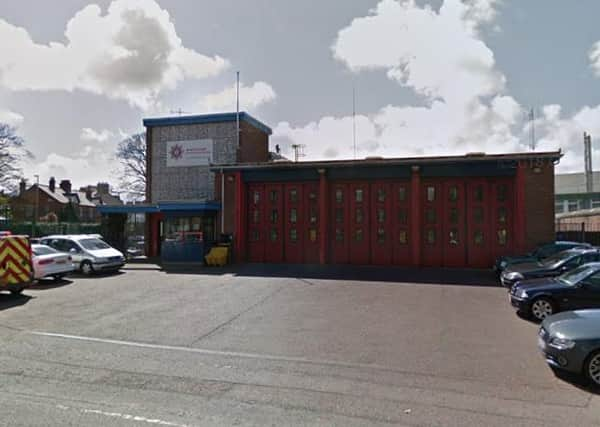MLA Storey writes to Robin Swann about NIFRS challenges


The Fire Brigades Union (FBU) has called the cuts to the service ‘outrageous’ cuts after management proposed reducing fire cover in some areas, while cutting emergency resources in Belfast, writes Gillian Anderson, Local Democracy Reporter.
The cuts are intended to make up a £3.26m shortfall in NIFRS’s revenue budget, following years of reductions from £81.6m in 2011/12 to £74.1m in 2019/20.
Advertisement
Hide AdAdvertisement
Hide AdIn a copy of the letter seen by the Local Democracy Reporting Service, Mr Storey said: “As you will recognise, a fully-staffed and fully-resourced fire service is critical to providing an effective and timely emergency response to Incidents right across Northern Ireland.
“The skill and dedication of our crews has been on display throughout the pandemic, particularly as staff took on extra responsibilities to assist, and ease pressure on, our health service.
“In this context I am deeply alarmed that since 2010, the numbers of firefighters employed locally have dropped by around 11% since 2010.”
According to the Fire Brigades Union (FBU), the proposed cost-cutting measures would reduce fire cover from full time to effectively part-time in Carrickfergus, Portadown, Omagh, Enniskillen, Newtownards and Armagh.
Advertisement
Hide AdAdvertisement
Hide AdThey would also remove one fire engine from the only fire station in the centre of Belfast and use specialist fire safety officers and junior managers to fill crewing shortages on fire engines across Northern Ireland, leaving crucial fire safety inspection work and risk-critical training further depleted.
The proposed measures would see the service use the only Specialist Rescue Team, intended for complex rescues, such as building collapses or water rescues, as a firefighting crew, potentially delaying their response to other emergencies.
Funds to improve fire cover in Downpatrick, Dungannon, and Strabane would be removed and it is understood stations in Antrim, Armagh and Coleraine could also be a risk as cuts are made.
Mr Storey’s letter continued: “It is also my understanding that in the current financial climate, NIFRS are preparing the groundwork for degradation measures, including the removal of overtime and assigning some stations to be retained or unmanned.
Advertisement
Hide AdAdvertisement
Hide Ad“These are regressive decisions which will have direct consequences for the provision of emergency services within local communities.”
The North Antrim MLA asked Mr Swann if he could ‘detail what steps your Department is taking to mitigate current budgetary constraints within NIFRS and retain the current level of service’, adding: “Moreover, can you confirm whether the Department has any plans to commission additional firefighter and staff roles as part of Its approach to the 2022/23 -2025/26 budget process?
“Finally can you outline steps you have taken to benchmark current staffing levels and health and wellbeing supports for firefighters with other jurisdictions, including In the rest of the United Kingdom and Republic of Ireland?”
Jim Quinn, Fire Brigades Union executive council member for Northern Ireland, said: “The plans show a shocking disregard for public safety and particularly the safety of provincial communities.
Advertisement
Hide AdAdvertisement
Hide Ad“Major residential areas will be left with slower response times and reduced fire cover which, frankly, is not enough to keep the public safe.
“Emergency response in Belfast is being stripped to the bare bone, seriously limiting our ability to respond to a fire like Primark, or, indeed, like Grenfell. This is not a template for the future, it’s a template for disaster. It’s outrageous and the FBU will not stand idly by.
“The latest proposed cuts follow years of deteriorating fire safety in Northern Ireland. Three fire engines equipped for use in high-rise buildings are no longer crewed, taking significantly longer to mobilise. The number of fire inspection officers has depleted well below the level necessary to carry out their vital safety role.
“NIFRS provides a cheaper cost per head of population fire service than England, Scotland or indeed Wales. Unlike services in England and Wales, NIFRS is a stand-alone fire and rescue service unable to call upon assistance from neighbouring brigades.”
Advertisement
Hide AdAdvertisement
Hide AdWhen contacted about the proposed cuts a spokesperson for the NIFRS said: “NIFRS is planning to introduce 30 new trainee Firefighters on January 4, 2022.
“This is in the face of budgetary pressures, which are not unique to NIFRS. To cope with those pressures NIFRS has implemented a series of management actions including restricting the use of Agency employees and managing overtime.
“NIFRS has in place a Business Continuity Plan to ensure that it can continue to deliver its service to the public in the safest and most effective way, regardless of the severity of the challenges it faces. This plan is designed to keep all Fire Stations open.
“Every day and every night Firefighters move between Fire Stations to provide the safest model for emergency response, this will continue.”